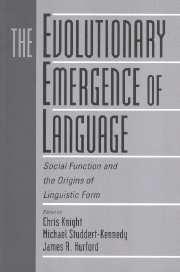Book contents
- Frontmatter
- Contents
- Contributors
- Acknowledgements
- Language: A Darwinian Adaptation?
- Part I The Evolution of Cooperative Communication
- Part II The Emergence of Phonetic Structure
- Part III The Emergence of Syntax
- 13 Introduction: The Emergence of Syntax
- 14 The Spandrels of the Linguistic Genotype
- 15 The Distinction Between Sentences and Noun Phrases: An Impediment to Language Evolution?
- 16 How Protolanguage Became Language
- 17 Holistic Utterances in Protolanguage: The Link from Primates to Humans
- 18 Syntax Without Natural Selection: How Compositionality Emerges from Vocabulary in a Population of Learners
- 19 Social Transmission Favours Linguistic Generalisation
- 20 Words, Memes and Language Evolution
- 21 On the Reconstruction of ‘Proto-World’ Word Order
- Epilogue
- Author Index
- Subject Index
19 - Social Transmission Favours Linguistic Generalisation
Published online by Cambridge University Press: 24 November 2009
- Frontmatter
- Contents
- Contributors
- Acknowledgements
- Language: A Darwinian Adaptation?
- Part I The Evolution of Cooperative Communication
- Part II The Emergence of Phonetic Structure
- Part III The Emergence of Syntax
- 13 Introduction: The Emergence of Syntax
- 14 The Spandrels of the Linguistic Genotype
- 15 The Distinction Between Sentences and Noun Phrases: An Impediment to Language Evolution?
- 16 How Protolanguage Became Language
- 17 Holistic Utterances in Protolanguage: The Link from Primates to Humans
- 18 Syntax Without Natural Selection: How Compositionality Emerges from Vocabulary in a Population of Learners
- 19 Social Transmission Favours Linguistic Generalisation
- 20 Words, Memes and Language Evolution
- 21 On the Reconstruction of ‘Proto-World’ Word Order
- Epilogue
- Author Index
- Subject Index
Summary
Introduction
This study focuses on the emergence and preservation of linguistic generalisations in a community. Generalisations originate in the innate capacities of individuals for language acquisition and invention. The cycle of language transmission through individual competences (I-languages) and public performance (E-language) selects differentially among innately available types of generalisation. Thus, certain types of general pattern tend to survive in the community's language system as a consequence of social transmission.
Computational simulations are described in which a population that initially shares no common signalling system converges over time on a coordinated system. For the emergence of shared vocabularies, the dynamics of such systems are now well understood (see for example Oliphant 1997 and Steels 1996a, 1996b, 1997, in press).
This chapter demonstrates how systems with syntax can emerge from the same fundamental population dynamics. The essential ingredients of the computational model are:
Individuals are capable of cognitively representing complex meanings.
Individuals who have no rules for signalling meanings have a repertoire of sounds which they may randomly emit when attempting to ‘express a meaning’.
Individuals are capable of inferring, or postulating, general correlations in observed pairings of complex meanings and strings of sounds.
Once inferred by an individual, a connection between a complex meaning and a sound sequence becomes the default basis for the expression of complex meanings by that individual.
- Type
- Chapter
- Information
- The Evolutionary Emergence of LanguageSocial Function and the Origins of Linguistic Form, pp. 324 - 352Publisher: Cambridge University PressPrint publication year: 2000
- 17
- Cited by



